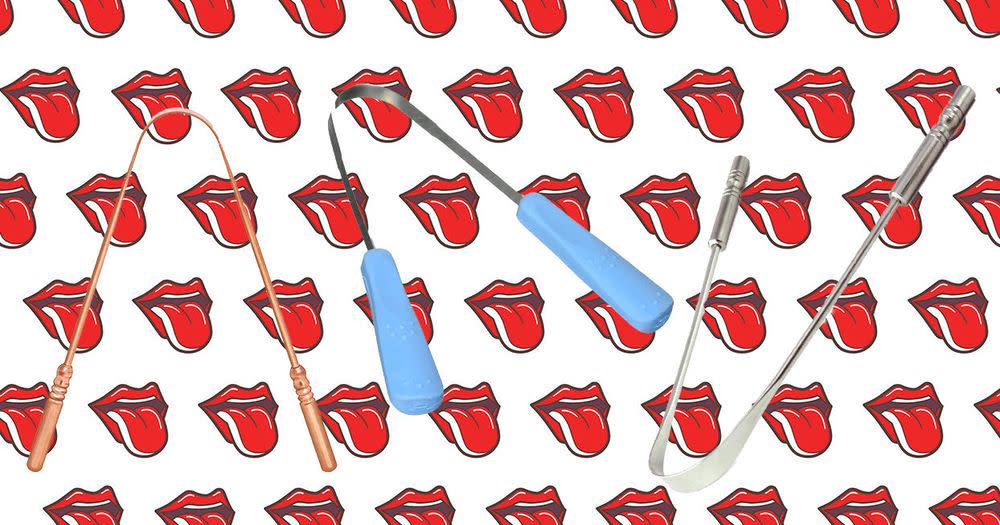Should You Be Using a Tongue Scraper or Tongue Cleaner?

Photo: Yurlick/Shutterstock, Amazon
There’s no question that tongue scraping has the same appeal as using a pore strip. You get the satisfaction of seeing visible gunk that you’ve scraped off the surface of your tongue, much like the grime that was in your pores. What's not so clear: Whether tongue scraping's actually worth doing on a regular basis. Depending on who you ask, tongue scraping can range from a key to overall wellness to a complete waste of time. If you're wondering which is more accurate, read on.
What does a tongue scraper do?
Exactly what you think. A tongue scraper is a tool with a curved edge that’s used to scrape bacteria and debris off the surface of the tongue. Tongue scraping is more widely considered a part of basic hygiene in the Eastern culture than Western. According to Ayurvedic tradition, tongue scraping is important for removing a coating on the tongue that can lead to discoloration, bad breath, and dulled taste. (Related: Ayurvedic Skin-Care Tips That Still Work Today)
Is a tongue scraper necessary?
According to the American Dental Association, tongue scraping is one way to "go the extra mile for your mouth," but not a necessary step. In addition, it hasn’t been proven to prevent bad breath or improve halitosis, per the ADA.
For most people, they’re pretty pointless, says to Oleg Drut, D.D.S., Clinical Director at Diamond Braces. "A tongue scraper doesn't really do much," he says. "You have bacteria living on your tongue. Any time a patient scrapes the bacteria, it goes back to the tongue. When somebody smokes a lot or uses a lot of nicotine, their tongue can become yellowish, but beyond that I don’t really see a big benefit of using a tongue scraper." He suggests using your toothbrush to clean your tongue rather than bothering with a separate tool. (Related: Should You Brush Your Teeth with Activated Charcoal Toothpaste?)
Dustin Cohen, D.M.D. believes that cleaning your tongue is important, but that choosing to use a scraper or brush is a matter of personal preference. (One 2013 study suggested the two are equally effective.) "Just like your teeth, your tongue can accumulate particles throughout the day," he says. "Your tongue has a lot of nooks and crannies that trap bacteria and food. Brushing or scraping your tongue helps to remove that buildup.”
How often should you use a tongue scraper?
Tongue scraping can be satisfying, but avoid going overboard. "You don’t want to scrape away all the good bacteria that’s supposed to be there. That can cause problems with other bad bacteria overgrowing," says Reynolds, D.D.S. "If you’re going to use it, make sure you’re using it carefully and not aggressively." If you decide to start tongue scraping, Dr. Reynolds advises limiting yourself to no more than once a day. (Related: This Woman Got "Black Hairy Tongue Disease" After Taking Antibiotics)
Which tongue scraper is the best?
Tongue scrapers are often made of copper or stainless steel, since both are less likely to harbor bacteria than plastic. Here are three best-selling options:
Health and Yoga Surgical Grade Stainless Steel Tongue Scraper
is the current best-selling tongue scraper on Amazon. It has a "non-gagging cleaning span" which definitely sounds like a plus.
Dr. Tung’s Tongue Stainless Steel Tongue Cleaner
, rings in at under $4 and is Kourtney Kardashian’s pick, for whatever that's worth.
Kosha Ayurveda Copper Tongue Scraper
is an attractive 100 percent copper option with an adjustable width.

